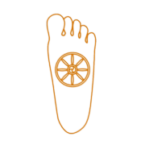This last Wednesday we had a lively conversation around the topic of our mental landscape – small worldly concerns becoming massive mental hindrances. Sometimes we make a decision and we don’t get to know if it was the right one, and we can agonize and worry and dwell on what could have been. It’s amazing how for each voice that spoke up with a similar experience, the perceived difficulty of dealing with fear, anxiety, and doubt grew smaller and smaller. Over time it becomes apparent that the things we all deal with the most are things we are all dealing with. They are part of the mind, and are in fact the very reason we started down the path of meditation in the first place.
It’s inevitable, months or years down the line, when we encounter these obstacles as big and looming as the day we started, that we might ask ourselves if we are getting anywhere. “Why Am I Doing This? What is this for?” It’s not an instantaneous path, or one with concrete this-for-that payoffs. It’s reassuring when we reflect that these thoughts and doubts are not coming up because of our practice. They are not a sign that we are doing anything wrong. If we think back, long before we heard about meditation and precepts and dhamma, weren’t there already fears and doubts? Sometimes it seems they have grown in severity, but it may just be that before we were led blindly around by them, and now we are looking right at them.
In the harder times, we grind away at our practice out of faith and habit. It’s natural that questions arise. People who don’t meditate question their lives too. All the time. What is different for the practitioner is that there are objective standards for if we are living skillfully. We can know what was skillful, what was unskillful, and what is subjective. We can delight in the skillful, make amends for the unskillful, and come to terms with questions of what was best we might never know for sure.
We can be active too. The counterpoint to faith is wisdom, and questioning is actually its tool. We can investigate the feelings of anxiety and doubt and really listen to what they suggest. Do our doubts portray realistic expectations? Are we expecting that because we sit a certain way or cultivate a certain thought that things will feel different or change? If we’ve been living in anxiety all our lives should those feelings really disappear overnight? It may well be that we are looking in the wrong place. Maybe the fears still arise, but we know they are fears and respond to them as such. Is that not the definition of mindfulness? Sometimes we overlook the ways that we are getting exactly the results we cultivated, simply because we are looking for other results.
One of the great values of Sangha is to have examples of where the practice can eventually lead. If there was one technique that solved all the problems of suffering, then dhamma teachers would just teach that. Instead, there are faculties that are cultivated and skills that are developed – the skills to weather difficulties and investigate their source. There may be no one ultimate technique, but with these faculties strong the thousands of little techniques that we develop can make a huge difference over time. If we find that after years of practice we still have errant thoughts but that we are processing, learning, adapting and finding support – is that really the same dukkha we started with? Or have we quietly become the very thing we wanted to be when we started out: masters of our own mind.
